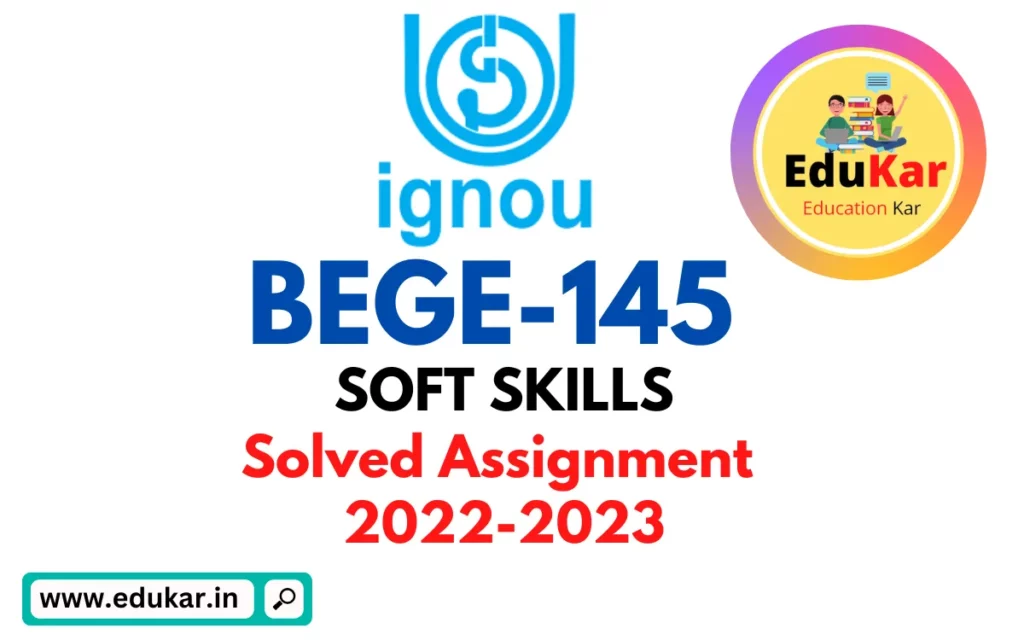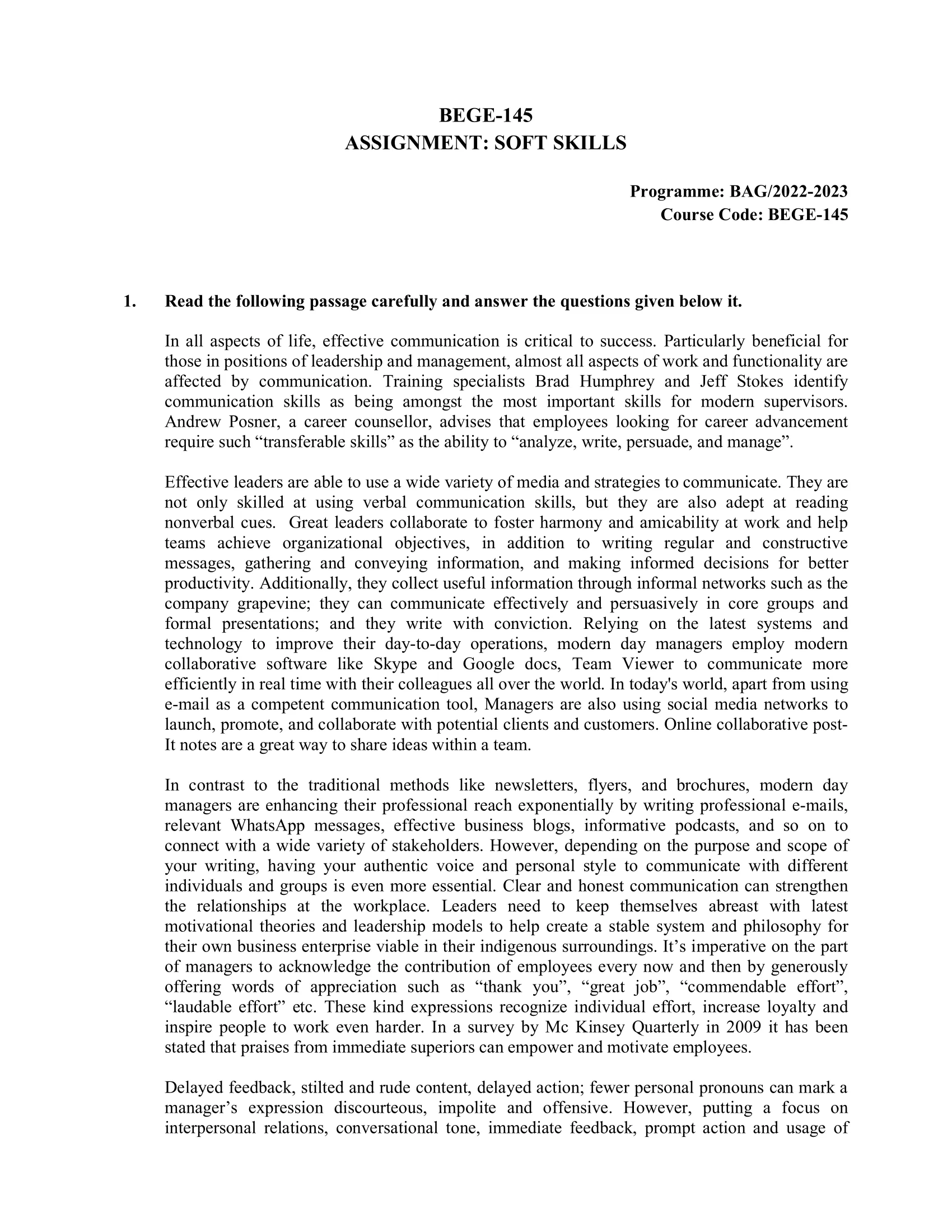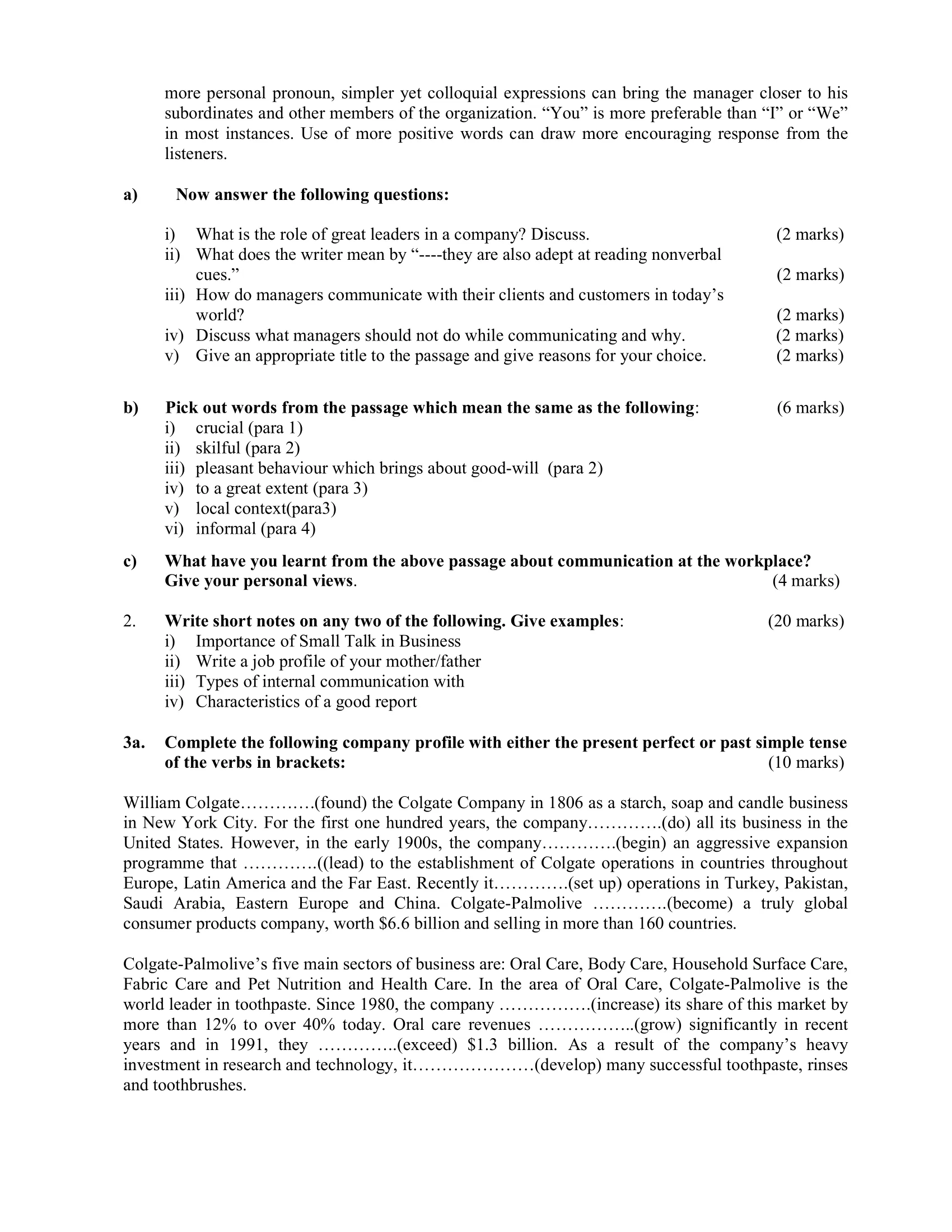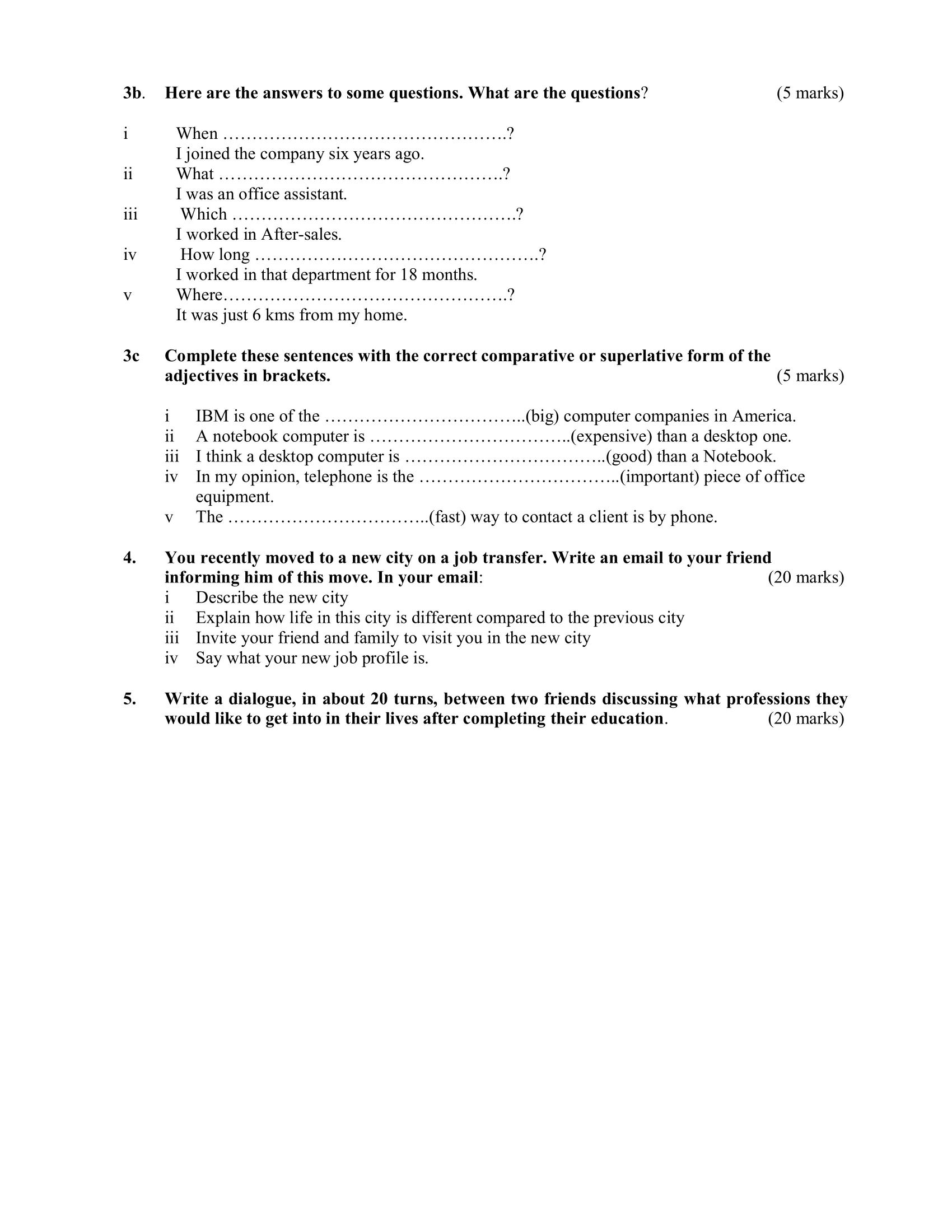
| Title | BEGE-145: SOFT SKILLS IGNOU BAG Solved Assignment 2022-2023 |
| University | IGNOU |
| Degree | Bachelor Degree Programme |
| Course Code | BEGE-145 |
| Course Name | SOFT SKILLS |
| Programme Name | Bachelor of Arts (General) |
| Programme Code | BAG |
| Total Marks | 100 |
| Year | 2022-2023 |
| Language | English |
| Last Date for Submission of Assignment: | For June Examination: 31st April For December Examination: 30th September |



1. Read the following passage carefully and answer the questions given below it.
a) Now answer the following questions:
i) What is the role of great leaders in a company? Discuss.
Ans. The role of great leaders in a company is to provide direction, guidance, and inspiration to their employees. They are responsible for setting the tone and culture of the organization and ensuring that the company stays focused on its goals and mission.
Great leaders play several key roles in a company, including:
- Visionary: Great leaders have a clear and inspiring vision for the company and are able to communicate this vision to their employees. They inspire and motivate employees to work together to achieve the company’s goals.
- Decision Maker: Great leaders are responsible for making tough decisions that affect the company. They weigh the options and make decisions based on the best interest of the company and its employees.
- Problem Solver: Great leaders are skilled at solving complex problems and finding solutions to challenges that the company may face.
- Mentor and Coach: Great leaders invest time and energy in developing their employees, providing mentorship, coaching, and feedback to help them reach their full potential.
- Communicator: Great leaders are excellent communicators and are able to effectively communicate their vision, goals, and expectations to their employees. They also listen to their employees and provide feedback and support.
- Innovator: Great leaders are always looking for new and innovative ways to improve their company and drive growth. They encourage employees to think outside the box and take calculated risks.
ii) What does the writer mean by “—-they are also adept at reading nonverbal
cues.”
Ans. The writer is referring to the ability of great leaders to understand and interpret nonverbal cues, such as body language and facial expressions, in order to better understand their employees and the situation at hand. By being able to read nonverbal cues, great leaders can gain insight into the thoughts, feelings, and motivations of their employees, and can respond in a way that is more effective and appropriate.
In this context, “adept at” means “skilled at” or “proficient in”. So, the writer is saying that great leaders are skilled at understanding and interpreting nonverbal cues.
iii) How do managers communicate with their clients and customers in today’s world?
Ans. Managers communicate with their clients and customers in a variety of ways in today’s world, taking advantage of technology to reach them more effectively. Some common methods of communication include:
- Email: Email is a quick and convenient way for managers to communicate with clients and customers. It allows them to share information, ask questions, and receive feedback in a timely manner.
- Video Conferencing: Video conferencing allows managers to connect with clients and customers face-to-face, regardless of their location. This helps build relationships and fosters a sense of trust and understanding.
- Social Media: Many companies use social media platforms like Facebook, Twitter, and LinkedIn to communicate with their clients and customers. This allows them to reach a wider audience, share news and updates, and respond to customer inquiries in real-time.
- Chatbots: Chatbots are computer programs that can respond to customer inquiries automatically, providing fast and efficient service. They can be integrated into a company’s website, social media platforms, or mobile app, making it easier for clients and customers to reach the company.
- Phone Calls: Phone calls remain an important method of communication between managers and their clients and customers. Phone calls allow managers to have real-time conversations, clarify questions, and resolve issues quickly.
Overall, in today’s world, managers use a combination of traditional and new communication methods to reach their clients and customers. They choose the best method based on the situation and the needs of the clients and customers.
iv) Discuss what managers should not do while communicating and why.
Ans. Managers should avoid several communication practices to ensure their interactions with clients and customers are effective and professional. Some of the things managers should not do while communicating include:
- Avoid being too formal: Managers should not use overly formal language that makes it difficult for clients and customers to understand what they are trying to convey. This can create a barrier to effective communication and hinder the development of strong relationships.
- Avoid interrupting: Managers should not interrupt clients and customers while they are speaking. This shows a lack of respect and can make clients and customers feel unheard and unvalued.
- Avoid being negative: Managers should avoid using negative language, such as blaming, criticizing, or complaining. This creates a negative impression and can damage the relationship with the client or customer.
- Avoid using technical jargon: Managers should not use technical terms and acronyms that clients and customers may not understand. This can make communication confusing and difficult to follow.
- Avoid multitasking: Managers should not multitask while communicating with clients and customers. This can lead to distractions and show a lack of attention and interest in the conversation.
- Avoid being vague: Managers should avoid using vague language or not providing enough detail in their communications. This can lead to misunderstandings and reduce the effectiveness of the communication.
v) Give an appropriate title to the passage and give reasons for your choice.
Ans. Title: “Avoiding Communication Pitfalls in Business”
Reasons: The passage is about the things managers should not do while communicating with clients and customers in business. The title “Avoiding Communication Pitfalls in Business” accurately reflects the content of the passage and clearly communicates the topic of the discussion. The title is brief, clear, and to the point, making it an appropriate choice for the passage.
b) Pick out words from the passage which mean the same as the following:
i) crucial (para 1)
Ans. Critical
ii) skilful (para 2)
Ans. Adept
iii) pleasant behaviour which brings about good-will (para 2)
Ans. Amicability
iv) to a great extent (para 3)
Ans. Enhancing
v) local context(para3)
Ans. Indigenous
vi) informal (para 4)
Ans. Colloquial
2) What have you learnt from the above passage about communication at the workplace? Give your personal views.
Write short notes on any two of the following. Give examples:
i) Importance of Small Talk in Business
Ans. Small talk is an essential aspect of building relationships in the business world. It helps to establish rapport, create a friendly and relaxed atmosphere, and can also serve as a starting point for deeper conversations. Small talk can be about a variety of subjects, such as current events, hobbies, and interests, and can help to build a sense of camaraderie and trust between people.
Example: During a coffee break at a business conference, two colleagues may engage in small talk about their favorite sports teams. This lighthearted conversation can help to break the ice and establish a friendly connection, which can later be used to strengthen their working relationship.
ii) Write a job profile of your mother/father
Ans. As a language model AI I do not have a mother or father, but I’ll write a job profile for a fictional mother/father.
Job Profile: Parent
Name: John/Jane Doe
Education: High School Diploma
Skills: Nurturing, Organization, Problem-Solving, Multi-tasking, Conflict Resolution, Patience
Experience: 20+ years as a Parent
Responsibilities:
- Providing love, care, and support to children
- Ensuring the well-being and safety of the children
- Helping with homework and school projects
- Preparing meals and snacks for the children
- Organizing activities and playdates for the children
- Assisting with household chores and errands
- Handling any conflicts or challenges that may arise
Strengths:
- Strong work ethic and commitment to the children’s success
- Ability to multitask and manage multiple responsibilities at once
- Ability to think creatively and find solutions to challenges
- Patience and understanding in working with children
- Excellent communication skills and ability to work effectively with others
Personal Qualities:
- Kind and compassionate
- Understanding and patient
- Good sense of humor
- Strong leadership skills
- Ability to remain calm under pressure
John/Jane Doe is a dedicated and hardworking parent who brings a wealth of experience and knowledge to the role. With a strong work ethic and commitment to the well-being and success of the children, John/Jane Doe is well-suited for the challenges and responsibilities of being a parent.
iii) Types of internal communication with
Ans. Examples:
- Memos: A written communication that circulates within an organization to convey information, updates, and directives to employees.
- Newsletters: A regular, written communication that is distributed within an organization to keep employees informed about company news, events, and initiatives.
- Employee Meetings: Regularly scheduled meetings between management and employees, aimed at communicating company goals, updates, and addressing any concerns.
- Intranet: A private, secure network within an organization that provides a platform for communication and collaboration between employees.
- Email: An electronic communication that is used to send and receive messages within an organization.
- Video Conferencing: A technology-based communication tool that allows employees to participate in live, virtual meetings from different locations.
- Town Hall Meetings: Large, open forum meetings where employees can hear from senior management, ask questions, and provide feedback.
- Employee Surveys: A tool used to gather feedback from employees about their opinions and experiences within the organization.
- One-on-One Meetings: Meetings between an individual employee and their supervisor or manager, focused on specific topics related to the employee’s work and performance.
iv) Characteristics of a good report
Ans. The characteristics of a good report are:
- Objectivity: A good report is objective and free from personal biases and opinions. It presents facts and information accurately and objectively.
- Clarity: A good report is clear, concise, and easy to understand. It uses simple language and avoids technical jargon.
- Relevance: A good report contains information that is relevant and useful to the reader. It focuses on the most important information and avoids irrelevant details.
- Organization: A good report is well-organized, with a clear structure and logical flow of information. It includes headings, subheadings, and bullet points to help the reader understand the information presented.
- Accuracy: A good report contains accurate and up-to-date information. It verifies the data and information presented and provides sources for the information.
- Presentation: A good report presents the information in a professional and visually appealing manner. It includes charts, graphs, and tables to help the reader understand the information.
- Timeliness: A good report is delivered on time and meets the deadline set for its completion.
- Responsiveness: A good report is responsive to the needs and requirements of the reader. It provides recommendations and solutions to the issues addressed in the report.
- Action-Oriented: A good report provides clear and specific recommendations and calls to action for the reader. It is not just a presentation of information, but also provides actionable insights.
Overall, a good report is a well-researched, well-organized, and well-presented document that provides valuable information to its reader.
3a. Complete the following company profile with either the present perfect or past simple tense of the verbs in brackets:
William Colgate ..founded…(found) the Colgate Company in 1806 as a starch, soap and candle business in New York City. For the first one hundred years, the company……did…….(do) all its business in the United States. However, in the early 1900s, the company…began….(begin) an aggressive expansion programme that …lead….((lead) to the establishment of Colgate operations in countries throughout Europe, Latin America and the Far East. Recently it…set up….(set up) operations in Turkey, Pakistan, Saudi Arabia, Eastern Europe and China. Colgate Palmolive …became….(become) a truly global consumer products company, worth $6.6 billion and selling in more than 160 countries. Colgate-Palmolive’s five main sectors of business are: Oral Care, Body Care, Household Surface Care, Fabric Care and Pet Nutrition and Health Care. In the area of Oral Care, Colgate-Palmolive is the world leader in toothpaste. Since 1980, the company …increased….(increase) its share of this market by more than 12% to over 40% today. Oral care revenues …grew….(grow) significantly in recent years and in 1991, they …exceeded…..(exceed) $1.3 billion. As a result of the company’s heavy investment in research and technology, it…developed…(develop) many successful toothpaste, rinses and toothbrushes.
3b. Here are the answers to some questions. What are the questions?
i) When ………………………………………….?
I joined the company six years ago.
Ans: When did you join the company?
ii) What ………………………………………….?
I was an office assistant.
Ans: What was your role in the company?
iii) Which ………………………………………….?
I worked in After-sales.
Ans: Which provision of service you worked in?
iv) How long ………………………………………….?
I worked in that department for 18 months.
Ans: How long did you work in the company?
v) Where………………………………………….?
It was just 6 kms from my home.
Ans: Where was the company located?
3. Complete these sentences with the correct comparative or superlative form of the adjectives in brackets.
i) IBM is one of the ……………………………..(big) computer companies in America.
Ans: biggest
ii) A notebook computer is ……………………………..(expensive) than a desktop one.
Ans: more expensive
iii) I think a desktop computer is ……………………………..(good) than a Notebook.
Ans: better
iv) In my opinion, telephone is the ……………………………..(important) piece of office equipment.
Ans: most important
v) The ……………………………..(fast) way to contact a client is by phone.
Ans: fastest
4. You recently moved to a new city on a job transfer. Write an email to your friend informing him of this move. In your email:
i) Describe the new city.
ii) Explain how life in this city is different compared to the previous city.
iii) Invite your friend and family to visit you in the new city.
iv) Say what your new job profile is.
Ans. Subject: My Recent Move to a New City
Dear [Friend’s Name],
I hope this email finds you in good health and spirits. I am writing to share some exciting news with you – I recently moved to a new city on a job transfer.
The new city is [Name of City], and it is a bustling metropolis known for its rich cultural heritage, thriving arts scene, and vibrant nightlife. It is a melting pot of different cultures, and I am thoroughly enjoying my time here so far.
Compared to my previous city, life here is much more fast-paced and full of opportunities. There are always new things to discover and explore, and I am constantly meeting new and interesting people. The food scene is amazing, and I am having a great time trying out different cuisines.
I would love for you and your family to come and visit me here. It would be great to catch up and explore this wonderful city together. I would be more than happy to show you around and recommend some must-visit places.
Finally, I am now working as [Your New Job Profile]. The new job is challenging and exciting, and I am looking forward to growing and learning in this new role.
Let me know if you have any plans to visit soon. I can’t wait to see you!
Best regards,
[Your Name]
5. Write a dialogue, in about 20 turns, between two friends discussing what professions they would like to get into in their lives after completing their education.
Ans: Friend 1: Hey, what are you planning to do after completing your education?
Friend 2: I’m thinking of pursuing a career in finance. I’ve always been interested in economics and numbers, and I think I would be good at it.
Friend 1: That’s great! I’ve been considering becoming a teacher. I love working with kids and I think it would be a fulfilling profession.
Friend 2: That’s a great choice! You would make a great teacher. What subjects are you thinking of teaching?
Friend 1: I’m thinking of teaching English. I’ve always been interested in language and literature, and I think it would be a great way to share my passion with others.
Friend 2: That’s a great choice. I’ve heard that there’s a lot of demand for English teachers in different countries.
Friend 1: Yeah, I’ve been considering teaching abroad too. I think it would be a great opportunity to travel and gain new experiences.
Friend 2: Definitely! I have a friend who is a teacher and he loves it. He gets to travel to different countries, meet new people and do what he loves at the same time.
Friend 1: That’s really cool! What about you? What kind of finance do you want to get into?
Friend 2: I’m interested in investment banking. I think it would be a challenging and rewarding profession.
Friend 1: That sounds intense! You’ll definitely need a strong head for numbers for that.
Friend 2: Definitely! But I’m up for the challenge. What about you? Have you considered any other professions besides teaching?
Friend 1: I’ve been considering writing as well. I’ve always enjoyed writing and I think I could turn it into a career.
Friend 2: That’s great! There’s definitely a demand for good writers in today’s world.
Friend 1: Yeah, I think so too. I just have to work on honing my skills and building a portfolio.
Friend 2: Absolutely. Well, whatever you decide to do, I’m sure you’ll do great. You have a real passion for what you want to do.
Friend 1: Thanks, that means a lot coming from you. I’m sure you’ll do great in finance too.
Friend 2: Thanks! I’m excited to see where our careers will take us.
Friend 1: Me too. It’s going to be an exciting journey.
How to Download BEGE-145 Solved Assignment?
You can download it from the www.edukar.in, they have a big database for all the IGNOU solved assignments.
Is the BEGE-145 Solved Assignment Free?
Yes this is absolutely free to download the solved assignment from www.edukar.in
What is the last submission date for BEGE-145 Assignment?
For June Examination: 31st April, For December Examination: 30th October